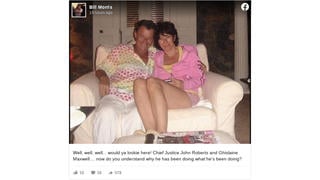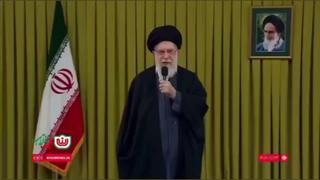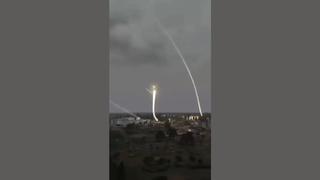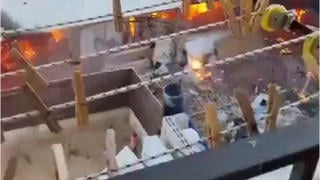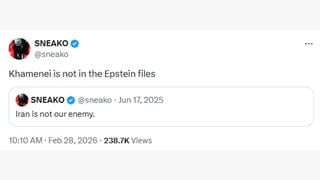STORY UPDATED: check for updates below.
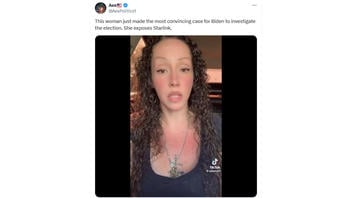
Did Elon Musk's satellite-based high-speed internet system Starlink play any role in counting or uploading votes in the U.S. election that could have allowed for potential vote manipulation or cheating? No, that's not true: Election security experts told Lead Stories that there's no evidence of vote tampering involving Starlink. U.S. voting systems are managed by county and state offices on secure, regulated networks and are often air-gapped, meaning they're isolated from the internet to prevent outside interference. Vote totals sent to state tally centers via internet services are then checked against the originating data, a process that would have uncovered in-transit tampering of the kind described by posts that theorize Starlink swung election results.
The claim appeared in a post and video (archived here) on X on November 9, 2024. The video's caption said:
This woman just made the most convincing case for Biden to investigate the election. She exposes Starlink.
This is what the post looked like on X at the time of writing:
(Source: X screenshot taken on Mon Nov 11 17:22:24 2024 UTC)
At 72 seconds into the clip, the woman in the video claimed that "California and other swing states were able to use Starlink in order to tally up and to count ballot votes or voting ballots in their state."
The post provided no evidence to support its assertion that Musk's satellite-based internet system played a role in counting or uploading votes in the U.S. election or, if it did, that it manipulated the ballot data.
Center for Election Innovation & Research
David Becker, executive director and founder of the nonpartisan, nonprofit Center for Election Innovation & Research, told Lead Stories in a November 11, 2024, phone interview that it would be "kind to say there is no evidence" of vote manipulation or cheating by the Starlink system. He continued:
I don't know the full capabilities of Starlink, but I doubt it has the ability to reach down and change what is written on the paper ballots in this country, including all of the ballots cast in all of the battleground states and 97% of all the ballots cast nationwide.
J. Alex Halderman, an elections security expert and a professor of computer science and engineering at the University of Michigan, agreed with Becker that there is no evidence that Starlink was used to change election data. In a November 11, 2024, email, he said votes are transmitted in various ways:
In some states, tabulators are connected to the Internet on election night (or to virtual networks that are carried over the Internet) in order to more rapidly return results on election night. ...
In some jurisdictions, results are transmitted wirelessly over the Internet from polling places, though it's more common to send them on removable media, like a memory card or USB stick. In most states results are first sent to a county-level election office and then sent over the Internet to the state.
Lead Stories found evidence that some voting tabulations were sent via Starlink but nothing to suggest it was manipulated or corrupted by the system. In a story by KFSN-TV (archived here), Tulare County Registrar Michelle Baldwin said Starlink improved internet connectivity there this year.
In Arizona, JP Martin, deputy communications director for Secretary of State Adrian Fontes, provided this response to a question on whether the state was using Starlink to transmit voting data. In a November 11, 2024, email, he said;
As part of a pilot program to enhance connectivity in underserved areas, our office has deployed Starlink systems in Coconino, Apache, and Navajo Counties to support ePollbook [E-Poll Book] synchronization.
According to the U.S. Election Assistance Commission, E-Poll Books (archived here) are:
'Equipment (including hardware, firmware, and software), materials, and documentation used to partially automate the process of checking in voters, assigning voters the correct ballot style, and marking off voters who have been issued a ballot.'
Becker told Lead Stories that the election system in the United States includes checks and balances. He said that even if something was changed in the transmission of the voting data, the process would double-check it for accuracy.
There are occasions where that information is transmitted by the internet, but it is reconciled against the hard copies as soon as they [county and state election officials] receive them. If someone intercepted or changed the transmission ... it would be discovered almost instantaneously. It would have been discovered many, many days ago.
Then the state aggregates the data and does that again to make sure it all matches and counts. So if that had happened, we would have known. ...
Becker continued:
[T]here are audits going on all over the country of the actual paper ballots, confirming that the paper ballot counts match what was reported by the machines to verify that the correct outcome was reached. So, if hypothetically, Starlink had this mythical ability to reach into machines that ... are never connected to the internet during voting, it would still be discovered because we have the paper ballots.
Dominion Voting Systems
Dominion, a major provider of voting systems in the United States, told Lead Stories that its voting machines would never be in contact with Starlink. In a November 11, 2024, email, a Dominion spokesperson said:
Dominion voting systems are designed and certified by the U.S. government to be closed systems that do not connect to the Internet. State and local requirements also serve to maintain air gaps for security.
The States
Lead Stories reached out to election officials in California and the seven swing states -- Arizona, Georgia, Michigan, Nevada, North Carolina, Pennsylvania and Wisconsin -- from the 2024 election and will report their responses to the claim involving Starlink circulating on social media as they are provided.
Arizona Secretary of State
The response from the Secretary of State's Office was used above in this fact check.
California
In a November 12, 2024, email to Lead Stories, Stephanie Hill, a systems and procedures analyst for the Tulare County Registrar of Voters, responded to Lead Stories' questions about technology and security measures there. She said (emphasis hers):
To ensure a reliable and stable connection for voter check-in, we utilized Starlink to enhance our internet connection. However, I want to emphasize that this connection is strictly for voter check-in purposes only and in no way a part of our voting system. In California, it is illegal for any part of the voting system to be connected to the internet. As such, our voting system operates within a fully air-gapped environment, meaning it is completely isolated from the internet and any other network.
Once vote tabulation is completed, we generate electronic files containing the results, which are then securely transferred to the Secretary of State's Election Night Reporting secure server. After this transfer, we verify the results with a representative of the Secretary of State's office during a phone call to ensure the accuracy of the data. I hope this provides clarity on the secure and legally compliant processes we follow to maintain the integrity of the voting system.
Georgia Secretary of State
Mike Hassinger, elections public information officer for Georgia Secretary of State Brad Raffensperger, provided this response in a November 12, 2024, email to Lead Stories:
I can tell you that this particular conspiracy is 100% bunk. Our voting machines are never connected to the Internet, not via Starlink or anything else.
North Carolina State Board of Elections
Patrick Gannon, public information director with the North Carolina State Board of Elections, told Lead Stories in a November 11, 2024, email that vote tabulators and "ballot-marking devices are never connected to the internet in North Carolina. In fact, it is prohibited by state law." He added:
Satellite-based internet devices were not used to tabulate or upload vote counts in North Carolina. In addition, our tabulated results are encrypted from source to destination preventing results being modified in transit. We have no evidence of any alteration of votes by anyone. We ask, again, that people stop spreading false information about elections.
Pennsylvania Department of State
Amy Gulli, a Pennsylvania Department of State spokesperson, provided this statement to Lead Stories via email on November 12, 2024:
Counties do not use Starlink to transmit unofficial or official election results. No voting system in Pennsylvania is ever connected to the internet.
Cybersecurity and Infrastructure Security Agency
In a November 12, 2024, email to Lead Stories, Ron Eckstein, senior advisor for public affairs at the Cybersecurity and Infrastructure Security Agency (CISA), shared a statement from Cait Conley, the senior advisor to the director. Conley was responding to questions about Starlink. She said, "There are a number of reasons why the nation's election infrastructure has never been more secure." She continued:
First, the machines Americans use to vote are not connected to the internet.
Second, election officials have put in place multiple layers of safeguards to protect election systems, including pre-election testing of equipment, cybersecurity protections, physical access controls, and post-election auditing.
Third, more than 97 percent of registered voters - including voters in every swing state - cast a ballot in jurisdictions where they received a paper record that they themselves could verify.
Finally, each state runs elections differently -- different processes, different equipment -- and this diverse and decentralized nature of our nation's election infrastructure creates tremendous resilience and ensures no single point of failure.
Conclusion
Near the end of his phone interview with Lead Stories, Becker said:
There are literally dozens of different types of devices used all over the country, in nearly 10,000 different jurisdictions. I mean, the idea that ... Elon Musk could push a button and change the outcome of the election [is a] crazy idea.
Read more
Additional Lead Stories fact checks on claims related to the 2024 U.S. general election and other elections are here.
Other Lead Stories fact checks on claims regarding Elon Musk can be found here.
Updates:
-
2024-11-12T22:45:27Z 2024-11-12T22:45:27Z Adds context from Cait Conley at the Cybersecurity and Infrastructure Security Agency. -
2024-11-12T21:56:19Z 2024-11-12T21:56:19Z Adds context from Tulare County, California, Registrar of Voters -
2024-11-12T18:17:09Z 2024-11-12T18:17:09Z Adds context from the Pennsylvania Department of State. -
2024-11-12T16:00:32Z 2024-11-12T16:00:32Z Adds context from the Georgia Secretary of State's Office.








